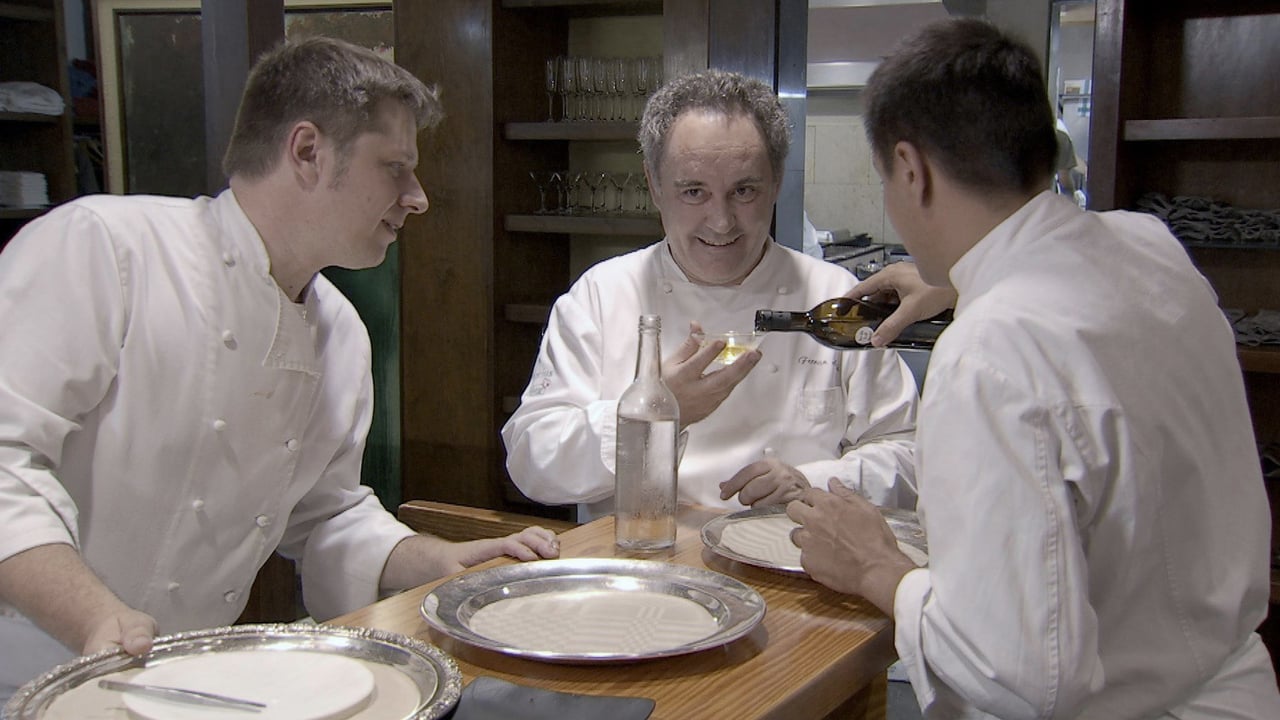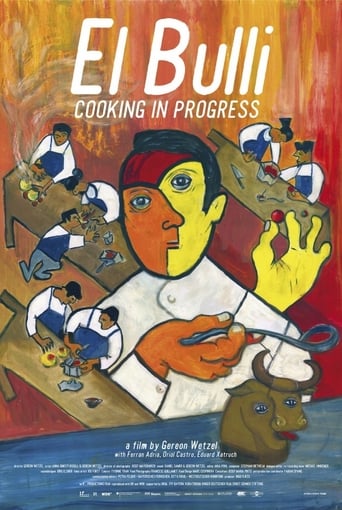



the leading man is my tpye
This Movie Can Only Be Described With One Word.
Masterful Movie
Intense, gripping, stylish and poignant
Visiting El Bulli was in my bucket list until they closed their doors in 2011 and became a food lab. As you can imagine, I was looking forward to seeing this documentary. Unfortunately, after watching, I got a bitter-sweet after-taste in my mouth. THE GOOD One of the things I enjoyed the most about this restaurant is seeing all the process of experimentation that leads top restaurants and world-class chefs to create a new menu every year, and the hard work and endless hours behind both the experimentation and the work in the restaurant. In the era of the MasterChef cooking shows, where food and cooking appear as a colorful, beautiful, creative and unrealistically flamboyant, the reality and every-day of a restaurant in general, and of a world-top restaurant in particular, is far from that bubble of flashy glamour that we see on TV. There is a lot of preparation, a lot of strenuous and hierarchical work, of endless working hours, of constant trial-error and improvement, exhausting and far from everything that is really unflashy. You need a passion for food and for restoration to devote your life to that profession, especially because in top restaurants failure is not an option, tempo is a mathematical thing, bad service is unthinkable, top quality preparation and presentation the norm. In that regard, this documentary captures that perfectly, and I think one gets to understand better and respect even more the work that any top chef does, in this case Adria. THE BAD The documentary is filmed with a Germanic eye, lacking passion or interest in the figure of Adria. Who is this guy? Where does he come from? What sort of cooking was he cooking before he became El Bulli head chef? Who does he consider his masters? Who are his sous-chefs? Also, there is a bunch of local and international workers arriving to work at El Bulli, why not asking them what drove them there? What is what they find intriguing or admirable in Adria and his restaurant? On the other hand, we don't see the human side of any of these people. Do they have families? Do they cook at home? What do they eat at home? Do they have foodie trips? Are they best pals with this and that top chef? These and other questions seem not to interest the director, which is a pity because they are the sort of things that interest viewers in general, especially those who aren't familiar with one of the master genius of modern cuisine. I'm not saying that the documentary is not interesting, because it is, but it lacks background, it lacks depth and color, and it lacks the passion that drives Adria in anything he does. Really, they could have filmed this in any medium-range restaurant and that would have been interesting the same. Yet, why bother going to El Bulli and focusing on the purely observational? Now that El Bulli doesn't exist any more, this documentary appears to be even more lacking and imperfect as it does not honor the genius, it does not help viewers understand why Adria is one of the genius of Western cuisine or who this person really is. I will personally be looking for other documentaries for TV and the cinema produced about Adria in 2011.
View MoreEl Bulli: Cooking in Progress. The subtitle obviously refers to the "work in progress" kind of modernist tradition undertakings, and I sympathize with this angle; I consider Ferran Andria's undertaking to be an artistic one and I would go as far as claiming that he puts a serious candidature for being this century's Picasso just for the sake and scale of Hispanic audacity (although his approach - and El Bulli's whereabouts are so alike the Cadaques mansion - are closer to Dali, the Dali of scientific preparation and preoccupation rather than the "surrealist"). Should this claim shock us just because it is put in the realm of culinary delights? What I found really instructive was that the fourfold team surrounding Andria for 11 years the most recent one worked like a crossbreed between a (quantum) physics laboratory and a Rennaissance studio where the apprentice takes crucial decisions for and in the canvas: this is ensemble work and clears any misconceptions about 'imagination' and 'predetermined decisions' (I liked the learn-as-you-go approach both for the highly trained chefs and the seasonal staff).Some things were on this side of fishy though, as with the need to be supplied with a calendar concerning seafood and the best time to pick it by the local fisherman: did Andria really needed the local expertise at this time of his career? Also some experiments in the kitchen during the first part made me wonder how come they had not tried them some years back. But maybe this is the flip side of being unable to fathom what, say, water with oil would taste like and how magical, in what way can it be.And this is where the doc underscores for me: having the master chef scribble things at the last act of ultimate decisions while tasting the definitive menu had me simply craving: this was just mute. There was no sense of wonder, just opaqueness, no sense of worship for the man, just a casual presentation of someone preoccupied. Was casualness the point? This seems more like casualty to me, for it lacks the bite like, say, early on, of having Andria saying to one of his sous-chefs "Do not ever give me anything that does not taste well!" imperiously angry and controlled and straight-forward! I felt cheated in the end, for no matter how good the shooting of the courses (this was like a substitute for a third act), illustration ultimately signifies the mysteries of lifestyle.
View MoreThe strength of "El Bulli: Cooking in Progress" was that it gave you a very good idea of what it would be like to work there. There was extended footage of the restaurant in operation, but more time was spent observing the creative process of Adria's team as they spent 6 months in their Barcelona laboratory, experimenting with food stuffs and techniques as they developed the menu of new creations for El Bulli's next season. The significant weakness of the film was that the director failed to take advantage of this unique opportunity to explain Adria's philosophy and genius. While you came away with an understanding of some of that genius, you came away with way too much time spent watching Adria as he tasted and made notes on the many experiments. But still, for the majority of us who never ate at El Bulli, it was a great opportunity to experience the place and its food preparation and presentation, at least visually, from ringside seats!
View MoreI was excited to see this film at the SXSW film festival in Austin, TX. With no background knowledge about El Bulli or Ferran Adria prior to the screening, I hoped that this documentary would tell me about the kind of things they did. It didn't. At all. There were no interviews with the chefs (or ANYONE, for that matter) which allowed us to learn the background of the restaurant and the background of the chefs. It felt like the filmmakers just took all of the footage they got and, without editing or taking any out, they called it a movie. This caused the film to feel like it just presented the facts. It lacked a narrative idea. Yes, it was in chronological order, but it just seemed like the filmmakers didn't care about the film. So, if you want to learn more about El Bulli, you're much better off just doing research about it.
View More